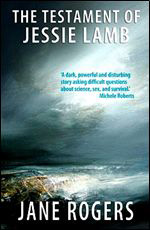
In this near future novel, the world is suffering from the sins of its previous generations. The survival of the human race is threatened by a new disease, Maternal Death Syndrome. MDS affects the brain, and it has infected everyone, although it is only activated in women when they become pregnant. It's fatal both for the women and their unborn babies.
When we begin this novel, 16-year-old Jessie Lamb is being held captive in a room, her ankles bound, by someone who we soon learn is her father. The captivity is to prevent Jessie from doing something that her father is opposed to.
Before the reader can digest the horror of this appalling situation, Rogers begins the backstory. Jessie and a somewhat loose-knit group of friends are upset with what is going on in the world around them. There is more than a little animosity towards parents and their generation, who the teens hold responsible for almost everything. The kids are looking to do something—to make a difference in the world—and they begin to explore groups organized around various causes, many with acronyms for names (I mention this because I had a tough time keeping the groups straight). Jessie is interested, though still somewhat directionless. She very much wants to do something, she just doesn't have a focus yet.
Jessie's father is a scientist working with others who are trying to find a cure for MDS. During the course of the novel, he explains to Jessie that there are many avenues being explored, some controversial. She loves her parents, despite the fact that, like most teens, she generally blames them for all the ills of the world. And her parents love her.
As the story progresses, Jessie's yearning to make a positive contribution grows into a passion and, without telling her parents, she volunteers to be a "Sleeping Beauty". She will be implanted with a pre-MDS embryo preserved from past IVF treatments that has been kept frozen and can now be vaccinated against MDS. Jessie will then be put in a coma while the fetus develops to term, and after the birth, she will be cut off from life support and die—a noble sacrifice for the continuation of the human race (it is no accident that Rogers has given her the name "lamb"). Needless to say, of course, her parents are not happy about her choice, nor are most of her friends.
Rogers does an excellent job creating the adolescent mindset, and I recognize in Jessie the search for identity and meaning, and the idealistic way of thinking, that so pervades adolescence. But I also understand the viewpoint of her parents, even the desperation of her father. The issue and the responses to it are complicated, as is Jessie's intended sacrifice—which makes for a very thought-provoking read and raises many questions. Are 16 year olds mature enough to sacrifice their lives for a cause, and should they be expected to make such a sacrifice? Would such experiments be ethical? Should parents have the right to stop their children from making such sacrifices?
Sometimes, the best books are those that disturb us, that shake up or challenge our often conventional thinking, so
that we question and examine our thoughts in a way that is both enlightening and invigorating. The Testament of
Jessie Lamb is one of these books.

Sandstone Press, paperback, 9781905207589 (UK)(Available now)
Harper Perennial, paperback, 9780062130808 (US/CAN)(May 2012)
